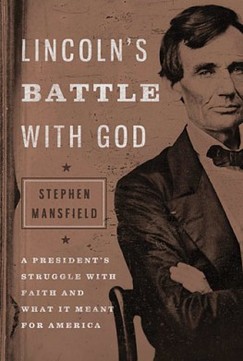BOOK REVIEWS
-
-

LINCOLN’S BATTLE WITH GOD: A PRESIDENT'S STRUGGLE WITH FAITH AND WHAT IT MEANT FOR AMERICA
By: Stephen Mansfield
Publisher: Thomas Nelson (First edition, 2012)
ISBN-10: 1595553096 ISBN-13: 978-1595553096
Christians, agnostics and atheists alike have claimed Abraham Lincoln as their own – how can this be? Historian Stephen Mansfield’s book examines the complex life of this great man and assesses the information we have that might support any or all of the claims of Lincoln’s faith – or lack of it.
A masterfully written and fascinating book, Lincoln’s Battle with God puts the life of the sixteenth president in a clearer perspective than is often found and shows not contradictory evidence, but the road to faith of a man who was clearly first an unbeliever, then later perhaps an agnostic, but finally a man of sincere faith.
But the story is not a simple straight line progression, as we see in Lincoln’s childhood. Lincoln's parents were fervent Baptists and although Lincoln loved his mother (who died when he was only ten), his relationship with his father was clearly a painful one. Perhaps as a direct result of these facts, Lincoln practically disavowed his father and certainly his father's religion, by the time he came of age, though his mother’s spiritual influence is clear in his childhood and seems to have stayed with him throughout much of his life.
At this stage in his life Lincoln became an avowed “infidel” or unbeliever and even went so far as to write a booklet on the subject which his close friends had the foresight to destroy. But as he matured, Lincoln gradually came to accept and finally even to choose religious belief, though his faith was never an orthodox one. Nevertheless, Mansfield clearly charts the journey to faith that Lincoln made – a journey that includes some of the greatest statements of belief in divine Providence made by any president.
Lincoln’s journey to faith also coincides with his growing desire for emancipation, which Mansfield documents with fascinating sources. He shows, for example, that according to Lincoln’s Secretary of the Treasury, Salmon Chase, the president told his Cabinet, "I determined, as soon as [the Confederate army] should be driven out of Maryland, to issue a Proclamation of Emancipation such as I thought most likely to be useful. I said nothing to any one; but I made the promise to myself and (hesitating a little) – to my Maker. The rebel army is now driven out, and I am going to fulfill that promise." Indeed, from a Christian perspective, it is easy to see how Lincoln’s growing faith could have been a part of the process of emancipation.
That Lincoln did come eventually to faith seems clear from dozens of instances of things he said and did in his later life. Importantly, it is not just in his public conversations and speeches that we see this, but in a great many of his documented private conversations and in notes that Lincoln wrote to himself. Nevertheless, Lincoln still stopped short of embracing full involvement in any denomination or creed. He reached his belief in God through a tortuous life journey, yet Mansfield shows that despite his lack of orthodoxy, Lincoln had indeed reached a position of faith.
History remembers Abraham Lincoln for the national struggle he oversaw and for the emancipation which he vowed and accomplished, but Mansfield sees Lincoln’s greatest battle as not one of the great conflicts of the Civil War, but the battle that raged over the years between Lincoln and God’s purpose in his life – a battle which Lincoln seems to have only slowly yet finally - and with peace of mind – conceded.